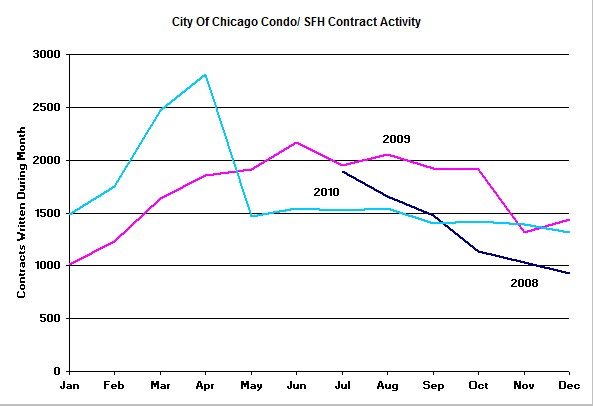Well I can’t exactly call a 20% decline in home sales from last year a turnaround, can I? But -20% is the number that the Illinois Association of Realtors is likely to report on Thursday for December home sales in Chicago relative to the prior year. But when you compare that to the recent 40% declines we’ve been experiencing it looks pretty darn good.
On the other hand approximately 43% of those sales were distressed properties – either short sales or foreclosures – which is up slightly from recent levels of 39%. Now this is based upon MLS data, which also indicates that foreclosures were 30% of total December sales for the city of Chicago. This is in sharp contrast to the foreclosure sale numbers I reported yesterday from RealtyTrac. They had foreclosures as only 11.5% of December sales. I’m going to have to stop showing their numbers. I just don’t believe them.
So is there any other “good news” to report here? Well, contract activity appears to be picking up and that should be a leading indicator of home sales. The graph below shows that contract volume has recently been flat compared to 2009 and has been higher than 2008 levels. Another way of looking at the data is that in 2010 we did not see the normal seasonal fall off at then end of the year. All of this is a clear improvement from earlier this year.

Did I miss any posts that includes a discussion of the foreclosure moratoriums and how that affects the Chicago real estate? If so, I apologize. Otherwise, I would think that would have some strong consequences on the market and the number of monthly sales.
Also, while it may not be in desired neighborhoods, but the Tribune had an article about banks waling away from another ~1,900 homes. (http://articles.chicagotribune.com/2011-01-13/news/ct-biz-0113-walkaway–20110113_1_foreclosure-process-foreclosure-filing-servicers)
In my opinion, there is still a lot of shadow inventory to get through before we can say we are seeing “Less Bad”.
I’ve referred to the moratoriums before but those are behind us now, correct? Or are some banks still holding off? I’m about to post some data I generated on distressed sales as a % of total sales. It’s high and has not really declined.
BTW, I’m not surprised that banks would like to walk away from some of these homes. I am shocked at how many properties sell for under $20K – even less than $10K. What’s the point?
I agree that it’s a smarter move for the banks to walk away from the home. But isn’t the mortgage written off the bank’s books only when there is a foreclosure? Doesn’t this overestimate the health of the banks? Granted the article only talks about Chicago, but I’m sure the major banks have similar situations in the other hard hit areas.
I look forward to seeing the data about the distressed sales. In my minimal research, I wasn’t able to find any dates the banks moratoriums. However, Assuming they were lifted November 15, I would think that the lawyers need to re-file (or file amended) paperwork. My understanding was that the banks pulled a very large chunk of houses off of the market to make sure there were no mistakes. If I’m correct, it has to take some time to get these houses re-listed and (eventually) sold. Just getting an offer accepted can take a month. By February, we should expect to see the ‘real’ distressed activity.
Writing off the loan is a book entry for the bank. It doesn’t have to foreclose, and why would it go thru the trouble for some house in awful shape worth $20,000 (maybe) in a neighborhood that isn’t even close to turning around. (Also, why would the bank want the responsibility to maintain the property.) The bank is getting what it deserved for making a bad loan — lost of loan principal.
The city needs to do a better job securing these properties, working with non-profits to put the property to use as housing for deserving families, and stabilizing these areas.
It will be interesting to see how it plays out, but my money is on the city of Chicago going after anyone and everyone that they might be able to collect money from. This includes the deed holder, which in this example is a bank. They could actually incur additional fees and fines for not paying property tax or having an unkempt property.
These types of situations are truly a shame. Hopefully the city will start using the funds from their federal grants to buy abandoned houses and, at least, slow down the process.